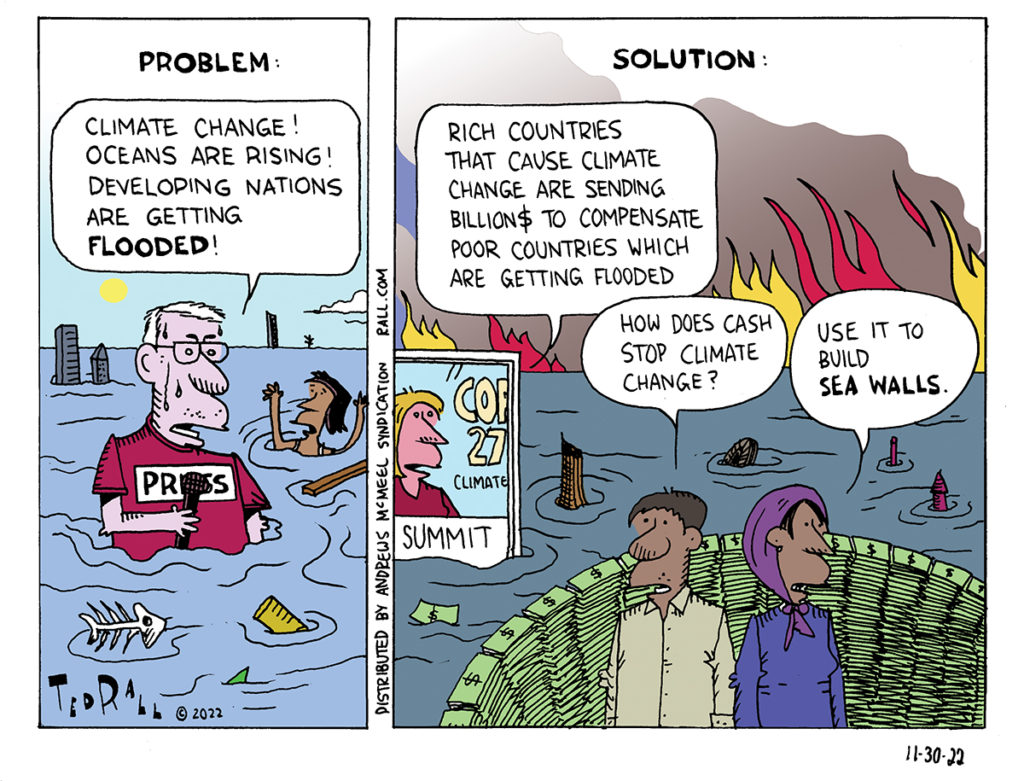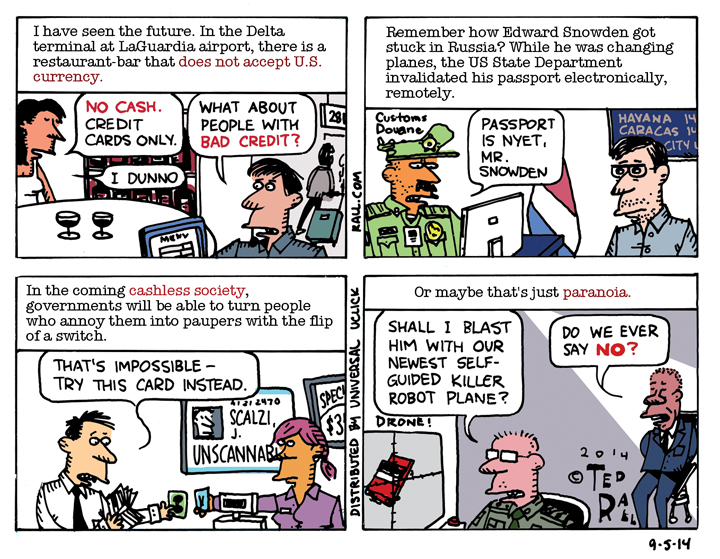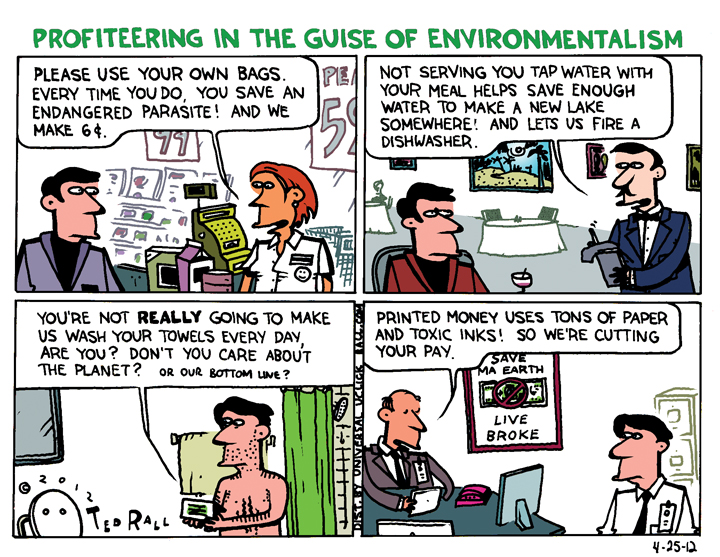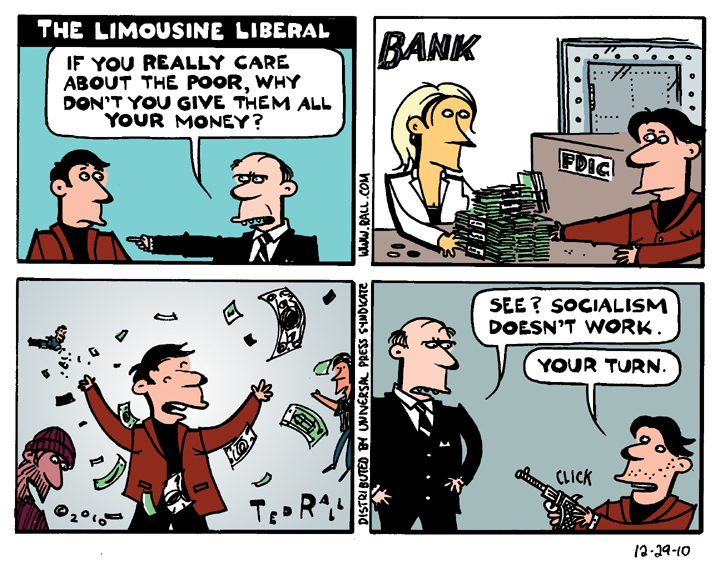I live in New York City, where many homeless people rely on panhandling in order to get by. A few days ago I saw a Millennial woman turn down a request from a homeless man, saying, “I don’t carry cash.” I have long been concerned about the ramifications of our increasingly cashless society, like the ability of the government to lock down our bank accounts and ability to move freely. As usual, the poorest among us are paying the biggest price for what we’ve been told is progress.
Nice Idea, but How Does It Help Climate Change?
The COP27 climate change conference was supposed to come up with concrete solutions to global warming. Instead, developing nations shook down wealthy nations for compensation on the basis that the countries that contribute to climate change should pay for the damage to the developing world. All well and good, but how does this reverse climate change?
SYNDICATED COLUMN: Still Trust Them? Now the Government Is Tracking You So It Can Steal Your Car
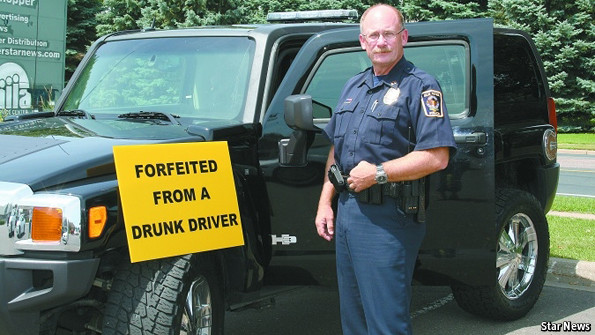
According to federal government documents released under the Freedom of Information Act, federal and local law enforcement agencies are using incredibly sneaky technology to track you as you drive the nation’s streets and highways. Their goal? Stealing your car.
This latest scandal — a mash-up of privacy violations on a wide NSA-like scale, corrupt asset forfeiture programs that make a mockery of the U.S. as a nation that respects private property rights, and brazen targeting of lawful gun owners — is a perfect political storm, an outrage that ought to bring liberals, libertarians and conservatives together in an alliance of freedom-loving people against an out-of-control government.
Given the collective shrug elicited by the Edward Snowden revelations, however, expecting a big reaction may be unrealistic.
In the shell of a nut: the ACLU has learned that the DEA and local police departments are scanning every motorist’s license plate as they drive down American streets. The NYPD and LAPD have each already collected hundreds of millions of time- and place-tagged license plate scans. One private security corporation sells its composite list of 2 billion scans to any police department or government agency that wants it. The Department of Homeland Security is teaming up with Immigration and Customs Enforcement to build and maintain a national database of license plate data to be shared with other parts of the U.S. security state apparatus.
Aggregated and analyzed, license plate tracking data forms a sophisticated model of your, and my, and everyone else’s habits, associations, shopping habits, friendships, and other activities. If you visit a porn store, they know — and their algorithms can predict when you’ll go again. But blackmail is not what’s on the cops’ minds…not for now, anyway.
They want your cash.
“Asset forfeiture” programs have become big business for law enforcement. Relying on dubious interpretations of the Constitution’s prohibition against unreasonable search and seizure, American police agencies are taking in billions of dollars a year from people they arrest. “Since 2008, thousands of local and state police agencies have made more than 55,000 seizures of cash and property worth $3 billion under a civil asset forfeiture program at the Justice Department called Equitable Sharing,” according to The Washington Post.
Total take: $5.3 billion.
If you think they’re confiscating the mounds of coke and machine guns they find in a drug kingpin’s trunk, think again. Pulled over for DUI? They take your car, sell it at auction and pocket the proceeds, or keep it for the cops’ own use. That’s on top of whatever jail time and fine the judge hands you if you get convicted.
Even if you’re found not guilty, they keep your car. And/or your cash. And/or jewelry. Anything valuable. Anything they want.
“No criminal charges are necessary for such seizures, and under federal and state laws, authorities may keep most or all seized assets even in the absence of formal charges. Countless innocent Americans have been victimized by what critics call legalized government theft,” according to The Wall Street Journal. “Police have made cash seizures worth almost $2.5 billion from motorists and others without search warrants or indictments since the terrorist attacks of Sept. 11, 2001,” says the Post. “Police spent the seizure proceeds with little oversight, in some cases buying luxury cars, high-powered weapons and military-grade gear such as armored cars.”
Talk about un-American: these renegade robber-cops are traitors.
Police have been so pleased with the money and other goodies they nab through asset forfeiture programs that they send officers to seminars that teach them how to maximize their take. Some victims have complained, and successfully proven in court, that they were targeted and entrapped by police whose motivation to detain and arrest them was solely to steal their possessions — but it’s expensive and time-consuming.
Among the money-making schemes cooked up by greedy cops was a 2009 plan by the DEA to “work closely” with officials of the ATF (Bureau of Alcohol, Tobacco, Firearms and Explosives) “in attacking the guns going to [redacted by government censors] and the gun shows, to include programs/operation with LPRs [license plate readers] at the gun shows.”
But the DEA and ATF didn’t care about gun violence. “One internal email acknowledged that the tracking program’s primary purpose is civil asset forfeiture,” the Journal reports. They planned to set-up checkpoints around gun shows, search attendees’ cars using the pretext of a traffic stop, and arrest drivers on whatever charge they can come up with — some legit, others ginned up, in some cases no indictment at all — as an excuse to take their money and their cars. Which, even if they beat the rap, the cops get to keep.
Note to self: carry $5 in cash, use a debit card.
The UK Guardian reports: “According to DEA documents, the primary goal of the program was to seize cars, cash and other assets belonging to criminals. However, the [license plate reader] database’s expansion ‘throughout the United States,’ as one email put it, also widened law enforcers’ capacity for asset forfeiture.”
“It’s deeply concerning and creepy,” lawyer Clark Neily of the libertarian Institute for Justice told the newspaper. “We’re Americans. We drive a lot.”
It is also disgusting, cause for the immediate firing of every “law enforcement” official who has overseen an asset forfeiture program, and a perfect illustration of why only an idiot would trust the government.
(Ted Rall, syndicated writer and cartoonist for The Los Angeles Times, is the author of the new critically-acclaimed book “After We Kill You, We Will Welcome You Back As Honored Guests: Unembedded in Afghanistan.” Subscribe to Ted Rall at Beacon.)
COPYRIGHT 2015 TED RALL, DISTRIBUTED BY CREATORS.COM
SYNDICATED COLUMN: Next: Digital Totalitarianism
The Conspiracy to Abolish Cash
For many years figures on the political fringe, especially on the right, have claimed that the government and its corporate owners want to transform us into a cashless society. Their warnings about the conspiracy against paper money fell on deaf ears, primarily because the digitalization of financial transactions seemed more like the result of organic business trends than the manifestation of some sinister conspiracy.
Now, however, those who want to do away with liquid currency are stepping out of the shadows. They talk about increased efficiency and profit potential, but their real agenda is nothing less than enslavement of the human race.
“Physical currency is a bulky, germ-smeared, carbon-intensive, expensive medium of exchange. Let’s dump it,” argued David Wolman in Wired.
Citing a 2002 study for the Organization for Economic Development that states “money’s destiny is to become digital, ” a Defense Department-affiliated economics professor has authored an Op/Ed for The New York Times that asks: “Why not eliminate the use of physical cash worldwide?” Jonathan Lipow urges President Obama to “push for an international agreement to eliminate the largest-denomination bills” and urges the replacement of bills and coins by “smart cards with biometric security features.”
Lipow’s justification for calling for the most radical change to the fundamental nature of commerce since industrialization is, of all things, fighting terrorism. “In a cashless economy, insurgents’ and terrorists’ electronic payments would generate audit trails that could be screened by data mining software; every payment and transfer would yield a treasure trove of information about their agents, their locations and their intentions,” Lipow writes. “This would pose similar challenges for criminals.”
Terrorism is a mere fig leaf. According to the annual “Patterns of Global Terrorism” report compiled by the U.S. State Department, the highest total death toll attributed to terrorism in the last 20 years occurred in—surprise—2001. Including 9/11, only 3,547 people were killed in 346 acts of violence worldwide. Tragic. Obviously. But, in the overall scheme of things, terrorism is not a big deal.
Measured in terms of loss of life and economic disruption, terrorism is a trivial problem, hardly worth mentioning. According to the UN, 36 million people die annually from hunger and malnutrition. Over half a million die in car wrecks—but you don’t hear people like Lipow demanding that we get rid of cars. A more legitimate concern is the “loss” of taxes upon the underground economy, estimated by the IMF at 15 percent of transactions in developed nations.
What the anti-cash movement really wants is digital totalitarianism: a dystopian nightmare in which the entire human race is enslaved by international corporations and their pet governments. An anti-establishment gadfly like WikiLeaks founder Julian Assange could be instantly deprived of money—and thus freedom of movement—with a couple of keystrokes. (We saw a preview of this when PayPal and Amazon shut down WikiLeaks donation mechanism and web server, respectively.) The high-tech hell depicted by the film “Enemy of the State” would become reality.
It is true that, in a society where every good and service has to be paid for with a debit or credit card, terrorist groups would find it much harder to operate. Don’t forget, however, that today’s terrorists often become tomorrow’s liberators. Anti-British terrorists George Washington and Thomas Jefferson wouldn’t have stood a chance if the Brits had been able to intercept wire transfers from France.
Decashification would establish digital totalitarianism, a form of corporo-government control so rigid, thorough and all-encompassing that by comparison it would make Hitler and Stalin look like easygoing surfer dudes. The abolition of unregulated financial transactions would freeze the political configuration of the world, making it impossible for opposition movements—much less revolutionary ones—to challenge the status quo.
A society without dissent has no hope. Even if we lived in a perfect world where everyone was ruled by wildly popular, benevolent, scrupulously honest regimes—ha!—eliminating the slightest possibility of opposition would lead to barbarism.
We’re already more than halfway to a cashless society. In the U.S. few young adults still use checks. In many countries debit and credit card transactions now exceed those made via cash and checks combined. In 2007 the chairman of Visa Europe predicted the abolition of cash by 2012. Obviously he was wrong. But that’s where we’re headed. The U.K. plans to abolish checking accounts by 2018.
Even if you love your government, don’t want it to change, and think political opponents belong in prison, you ought to worry. As things currently stand, we know the big banks can’t be trusted. Remember when they introduced ATM cards? Banks wanted us to use them so they could lay off tellers. Then they instituted “convenience fees.” Which they have raised, and raised, to the point that taking $20 out of an out-of-town ATM could cost you $5 in fees ($2 for their bank, $3 for yours).
Imagine what your life will look like under digital totalitarianism. Your pay is direct-deposited into your bank account. You’ll pay for small purchases with your cellphone; if you owe a few bucks to a friend you’ll be able to bump your phone against your friend’s to settle up. Nowadays, some corporations allow you to control when your bills get deducted; in the future they’ll demand that you authorize them to do it automatically. What if you have a disputed charge? They’ll already have your dollars, or work credits, or whatever they’ll call them. Good luck trying to get it back from the Indian call-center guy.
As corporate ownership becomes increasingly monopolized and intertwined, your overdue phone bill might be owned by the same outfit as your bank, which would simply take what it says you owe.
The law of unintended consequences is getting a serious workout thanks to digitalization. Motorists in New York were thrilled when the EZPass system allowed them to breeze past lines at toll bridges—at a discount, no less. Then divorce lawyers began subpoenaing EZPass records to prove that a spouse was cheating. Next police set up EZPass scanners on the bridges; if you pass two of them too fast, a speeding ticket is automatically generated. The next step is to eliminate cash lanes entirely; non-EZPass tag holders will soon have their license plates scanned and receive a bill by mail—plus a $2 to $3 “handling” fee.
Think there are too many fees now? If you think you can’t trust banks now, imagine how badly they’ll gouge you when they control every single commercial transaction down to the purchase of a pack of gum. Angry about taxes? When tax agencies can take the money out of your account without asking, they will. Unlike cash, that phone bump to pay your friend will be a trackable, data mineable, fully taxable commercial transaction.
As if the post-2008 economic collapse hadn’t proven that no one is looking out for We the People but ourselves—and then barely so—the digivangelists tell us not to worry, that Big Brother, Inc. will smooth out the rough patches on the road to techno-fascist domination. From Wolman in Wired: “Opponents used to argue that killing cash would hurt low-income workers—for instance, by eliminating cash tips. But a modest increase in the minimum wage would offset that loss; government savings from not printing money could go toward lower taxes for employers.” Sure. The same way banks passed on the savings they earned by replacing tellers with ATMs to their customers.
Americans are skipping into the digital inferno wearing a smile and relishing the smell of their own burning flesh. Countless friends and acquaintances pay all their bills online. “I’m all about using my checking account in place of cash and would love to be able to eliminate cash entirely from my life,” gushed PCWorld’s Tony Bradley recently.
“Give me convenience or give me death” was the title of an album by the punk band Dead Kennedys.
We’ll get both.
(Ted Rall is the author of “The Anti-American Manifesto.” His website is tedrall.com.)
COPYRIGHT 2010 TED RALL


